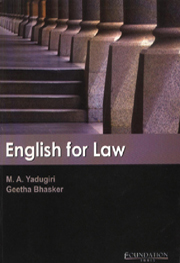Book contents
- Frontmatter
- Preface
- Contents
- A Note to the Student
- Notes to the Teacher
- 1 Nature of Law
- 2 Crimes and Civil Wrongs
- 3 Command of Language in the Profession of the Law
- 4 Plain Language and the Law
- 5 The Indian Constitution
- 6 The Impact of Technology on the Practice of Law
- 7 The International Court of Justice
- 8 Application of Precedents
- 9 Statutory Interpretation
- 10 Legal Reasoning
- 11 Plaints and Writs
- 12 Judgment
- 13 Of Defamation
- 14 Consumer Protection (Amendment) Act, 1993
- 15 The Information Technology Act, 2000
- 16 Universal Declaration of Human Rights
- Answer Key
10 - Legal Reasoning
Published online by Cambridge University Press: 26 October 2011
- Frontmatter
- Preface
- Contents
- A Note to the Student
- Notes to the Teacher
- 1 Nature of Law
- 2 Crimes and Civil Wrongs
- 3 Command of Language in the Profession of the Law
- 4 Plain Language and the Law
- 5 The Indian Constitution
- 6 The Impact of Technology on the Practice of Law
- 7 The International Court of Justice
- 8 Application of Precedents
- 9 Statutory Interpretation
- 10 Legal Reasoning
- 11 Plaints and Writs
- 12 Judgment
- 13 Of Defamation
- 14 Consumer Protection (Amendment) Act, 1993
- 15 The Information Technology Act, 2000
- 16 Universal Declaration of Human Rights
- Answer Key
Summary
The judicial process stands in a class of its own; it involves different kinds of reasoning.
INDUCTION
This applies to finding a major premise. The term ‘induction’ is not a happy one but will serve for want of a better. The process bears only a broad parallel to scientific induction in so far as it proceeds from instances of particular cases to a generalised rule. ‘Facts of case A were decided Y’; ‘Facts of case B were decided Y’; Therefore, strictly, facts A and B should be decided Y’. It may, however, be reasonable to extract a broader proposition capable of yielding decision Y in situation C (and perhaps D and E) as well. Any such broader proposition has to be reasonably warranted by the material out of which it was extracted, or it is liable to be cut down as being too wide by a later court.
There are differences between this type of reasoning and scientific induction:
a. A scientist can repeat his experiment and verify his principle; a judge cannot.
b. Scientific principles result from observations of data; judicial principles result from statements of fact and value-judgments.
c. A judge can reason by analogy and choose between competing analogies; a scientist does not.
d. A scientific principle has to be modified so as to accommodate new data; judicial principles are modified in response to moral and policy considerations.
[…]
- Type
- Chapter
- Information
- English for Law , pp. 338 - 367Publisher: Foundation BooksPrint publication year: 2005



